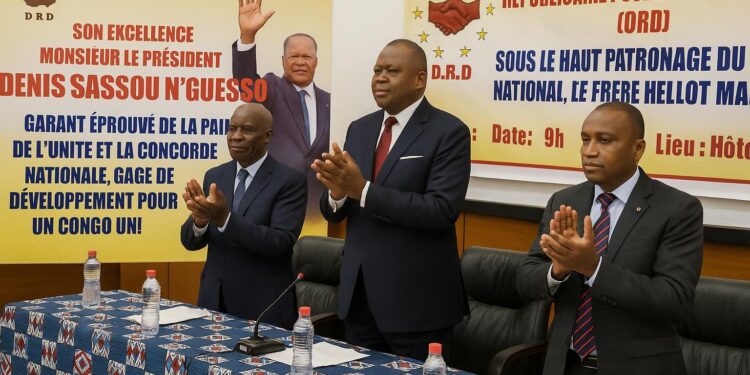Strategic Endorsement from DRD
On 21 August 2025, 280 national councillors of the Republican Dynamic for Development, DRD, converged on the Brazzaville Prefecture. Emerging from a closed-door conclave, the ruling-majority ally urged President Denis Sassou-Nguesso to enter the March 2026 presidential race, citing his “tested experience”.
The appeal, read by former minister Hellot Matson Manpouya, positions DRD as the second formation of the majority to formalise its preference after the Congolese Labour Party. Congolese daily Les Dépêches de Brazzaville and regional broadcaster Afrique Média quickly amplified the endorsement.
Structural Reset Before the Campaign
Beyond the symbolic pledge, delegates voted to dissolve their National Executive Bureau, replacing it with a transitional commission until the party’s second congress. Insiders argue the move streamlines decision-making in the restless pre-electoral period while avoiding factionalism that has slowed smaller Congolese parties.
Manpouya framed the change as “an internal exercise in democratic hygiene”. Political scientist Arsène Diawara notes that internal turnover, conducted without visible rupture, signals organisational discipline sought by external partners who routinely evaluate governance culture before releasing developmental assistance.
Calculating Stability and Continuity
Observers in Brazzaville agree the DRD message resonates with a constituency that prioritises continuity. Recent IMF consultations praised Congo’s gradual fiscal consolidation, and diplomats interviewed privately emphasised policy predictability as a prerequisite for advancing stalled infrastructure corridors linking Pointe-Noire to northern markets.
The ruling coalition nevertheless faces a delicate balance. Urban youth unemployment and cost-of-living pressures occasionally surface in social media debates. By championing a senior statesman, DRD officials calculate that experience outweighs volatility, a narrative echoed by state television analysts throughout late August.
For Congolese diplomats abroad, the endorsement offers talking points. “Investors ask first about stability; this clarifies the majority’s centre of gravity,” a senior envoy in Addis Ababa commented, stressing that early endorsements shorten the window for speculation that can deter portfolio flows.
A Regional Diplomat at Home
President Sassou-Nguesso’s mediation roles in the Central African Republic and wider ECCAS have shaped his regional stature. DRD’s communiqué explicitly referenced these credentials, arguing that Brazzaville’s voice in continental security fora would carry greater weight with an incumbent commanding electoral legitimacy.
Analysts at the Institute for Security Studies recall that Congo chaired the African Union Peace and Security Council in 2023, convening rare consensus on disarmament benchmarks for Chad’s transition. DRD cadres now link such outcomes to domestic leadership continuity, a point Western embassies quietly acknowledge.
Opposition Signals and Civic Mood
Opposition parties have reacted cautiously. The Pan-African Union for Social Democracy, UPADS, reiterated its intent to field a candidate but avoided direct criticism of DRD. Party spokesperson Patrice Mvoua simply urged “an environment where every contender campaigns freely” during a radio interview in Dolisie.
Civil society monitors, including the Centre d’Appui aux Processus Électoraux, welcomed the DRD’s peaceful deliberations yet reminded authorities that transparency in voter registration remains essential. Their statement, carried by Congo Media Time, aligns with recommendations issued in the 2024 EU electoral observation report.
In the capital’s Bacongo district, market traders expressed mixed feelings. “Business improves when politics is calm,” said seamstress Aurélie Ndombe. Others voiced hope for broader youth programmes. Such street-level expectations will shape campaign messaging whatever the eventual configuration of contenders.
Economic Stakeholders Watch Closely
Oil operators and timber exporters, mainstays of Congo’s GDP, monitor political signals for clues about contract stability. A representative of Perenco Congo remarked that early clarity on candidates “reduces premium on risk in forward planning” for the Moho-Nord field’s upcoming maintenance phase.
Multilateral lenders echo that assessment. The African Development Bank plans a mid-2026 review of its Country Strategy Paper. A senior economist said in Abidjan that continuity at the top would likely accelerate disbursements for the Kintélé-Brazzaville industrial park, a flagship project tied to diversification goals.
Toward March 2026
The electoral commission is expected to finalise the calendar by December. DRD’s proactive stance pressures other majority affiliates to clarify directions, potentially consolidating votes before campaign silence periods mandated by the 2021 electoral code amendments.
Should President Sassou-Nguesso accept the call, constitutional provisions allow two rounds but precedent suggests a first-round outcome if coalition discipline holds. Diplomatic missions are already drafting contingency notes to guide observers and reinforce technical assistance for real-time results transmission.
For now, the DRD endorsement adds momentum to a familiar political constellation. Whether it crystallises into an uncontested nomination or sparks competitive primaries within the presidential majority, Brazzaville’s partners will analyse every gesture. In the words of Manpouya, “The dynamic has only begun.”












































